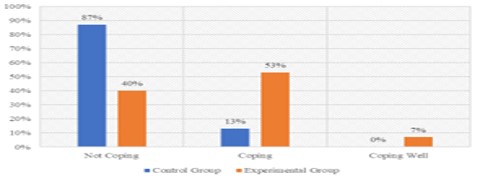


Journal of Clinical and Biomedical Sciences
Year: 2024, Volume: 14, Issue: 3, Pages: 99-104
Original Article
Renu 1, Deepak 2∗, Akoijam Mamata Devi3, Sonam K M4
1Community Health Officer, Sub-center, Govt. of Haryana, India
2Associate Professor, Department of Obstetrics and Gynecological Nursing, Faculty of Nursing, SGT University, Gurugram (Haryana)-122505, India
3Professor cum Principal, NEMCARE Institute of Nursing Sciences, Santipur, Mirza, Kamrup (R), Assam, India
4PG Tutor, Department of Obstetrics and Gynecological Nursing, Faculty of Nursing, SGT University, Gurugram(Haryana)-122505, India
*Corresponding Author Email: [email protected]
Received Date:26 August 2024, Accepted Date:12 September 2024, Published Date:30 September 2024
Background: Childbirth is a significant life event often associated with various physiological and psychological challenges, particularly for primigravida mothers, who undergo the process for the first time. Intrapartum coping behavior, encompassing psychological responses and coping strategies during labor and delivery, profoundly influences maternal well-being and birth outcomes. Child Birth Preparedness Programme (CBPP) aim to equip expectant mothers with essential knowledge and skills to navigate the birthing process effectively. Objective: The primary objective was to determine the effect of the CBPP on intrapartum coping behavior among primigravida mothers. Methods: A quantitative research approach was adopted, utilizing a quasi-experimental design. The study population comprised primigravida mothers at 38 weeks of gestation in the MCH wards of SGT Hospital. Purposive sampling was used to select 60 participants, with 30 in the control and experimental groups each. Data were collected using a standardized labor coping scale and analyzed using descriptive and inferential statistics. Results: The CBPP significantly improved coping behavior among primigravida mothers, with the experimental group exhibiting higher coping scores compared to the control group (mean score: 4.07 vs. 2.53, p < 0.05). Demographic variables such as education, husband's education, occupation, and knowledge regarding CBPP were associated with coping behavior. Conclusion: The study demonstrates the positive impact of CBPP on intrapartum coping behavior among primigravida mothers. Educational interventions and enhancing knowledge about CBPP can further improve coping strategies during childbirth. These findings underscore the importance of tailored childbirth preparation programs in promoting maternal well-being during labor and delivery.
Keywords
Childbirth preparedness, Primigravida mothers, Intrapartum coping behavior, Maternal outcomes, Maternal satisfaction
This is an open-access article distributed under the terms of the Creative Commons Attribution License, which permits unrestricted use, distribution, and reproduction in any medium, provided the original author and source are credited.
Published By Sri Devaraj Urs Academy of Higher Education, Kolar, Karnataka
Subscribe now for latest articles and news.